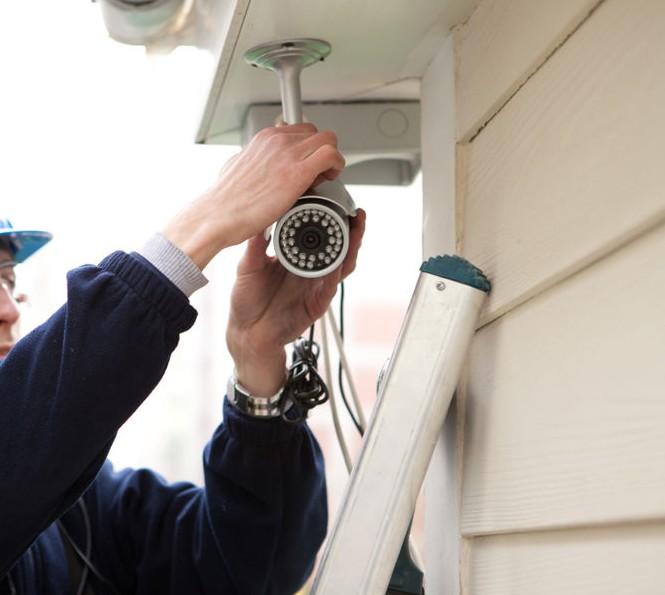The Internet of Things (IoT) has made our lives easier, more convenient, and more connected. This world of internet-connected objects – that includes everything from smart thermostats to virtual assistants to autonomous farming equipment– also makes businesses more efficient and all of us more environmentally-friendly. One of the biggest benefits of IoT technology, though, is that it is making us safer.
Of all the applications for IoT technology, the added safety and security it provides is among the most important. The internet is (often rightly) maligned for some of the negative aspects that come from it but the fact that it is also making us safer through the IoT is something for which it should be praised.
IoT technology makes us safer via several different paths. Below, we will talk about some applications for the IoT related to our safety and security. Here are five ways IoT makes us safer.
It Has Improved Home Security
In the past, the only way to protect your home with technology was with a pricey and complicated security or closed-circuit camera system. These systems cost a great deal of money, required highly-technical professional installation, and either needed to be monitored by a third party or recorded on-site. None of this was particularly helpful in keeping the average person or the average family safe.
The IoT has made home security incredibly easy, relatively inexpensive, and completely feasible for most people. Internet-connected security cameras, doorbell cameras, or security systems can now be purchased for a few hundred dollars or less. They can be installed by anyone who is even a little bit handy and can follow instructions. And, they can be controlled and accessed through the cloud and an app on your computer or mobile device.
IoT technology has democratized home security equipment so now almost anyone can have access to it if they want to do so. Peace of mind at home is no longer only accessible to the well-off or the technologically savvy. It is well within everyone’s reach.
It Helps Protect Our Food and Medicine
In several highly-regulated industries, raw materials and products are required to be kept in very specific environmental conditions to help ensure their effectiveness and safety for use. While these products are produced and moved through the cold supply chain (or simply, cold chain) IoT-enabled data loggers, which you can read more about in this guide from Dickson, are essential for safeguarding temperature-sensitive materials like certain foods or pharmaceuticals.
These internet-connected sensors record and transmit precise environmental data about temperature, humidity, and pressure. This data can be monitored by a cloud-based remote monitoring system. These systems allow the cold chain environments to be monitored from a central location by a single person or a small team. This saves money and makes the whole process more accurate and less labor-intensive.
The cold chain and it’s IoT data loggers have been in the news quite a bit lately in 2021. They are currently playing a key role in the COVID-19 vaccine distribution. The vaccines approved for use in the U.S. must be kept frozen or in a deep-=freeze from the time they are produced until the time they are thawed to be given to a patient and IoT data loggers are making this possible.
It Helps Get Information to Medical Professionals
IoT technology is also helping to keep us safer by keeping us healthier these days. One way it is doing this is through wearable health monitoring technology and software as a medical device (SaMD). These IoT technologies work like any medical device would to monitor vital signs, help calculate medication doses, or give a warning when signs of impending health issue episodes are present.
Instead of only being able to access these devices in medical facilities or having to bring a large device home, these are now available on your smartwatch, smartphone, tablet, or computer. These IoT healthcare devices are delivering real-time health information to both patients and medical professionals.
This gives patients greater control and ownership over their own treatment and health and allows doctors to monitor and evaluate patients at all times, not just during office visits. The end result is that IoT technology is improving overall patient results throughout the healthcare system. This makes us all a little safer from life’s health problems.
It Keeps Our Kids Safe at Schools
Unfortunately, violence in schools is a problem that is still around in 2021 and may even be getting worse for a handful of reasons. While the root issues are hopefully being addressed on many levels, IoT technology is helping keep students safe in the event a horrible event occurs at their school.
Schools are using IoT sound sensors to detect loud noises, like gunshots, and smart lighting systems to illuminate areas that are dangerous or safe during a violent event. Schools have also put geo-locational text alerts in place to warn students if an incident is occurring on campus or parents when their child is in a safe area.
It Makes Workplaces Safer
Certain heavy manufacturing jobs have traditionally been dangerous for people to work in. These jobs and the manufacturing processes themselves are being made safer through the use of IoT technology in 2021.
Workplace environments are using IoT sensors to measure air quality and alert workers if the air becomes unsafe. Other sensors warn workers if a machine becomes unsafe to operate. For the most dangerous tasks, IoT-enabled artificial intelligence (AI) systems and robots are taking over for humans to keep them out of harm’s way.
Conclusion
IoT is changing modern life in many ways in 2021. The biggest way, though, might be that it is making us safer. IoT devices are making our homes, our food, our medicine, our bodies, our schools, and our workplaces much safer places. As IoT develops further, there are sure to be even more ways the technology will help keep us safe. IoT is changing the world but this may be its longest-lasting and most important legacy.
